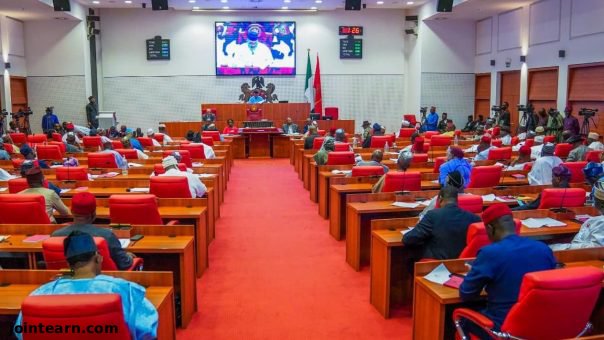
The Senate has kicked off major financial sector reforms, proposing to raise the capital base of the Nigerian Export-Import Bank (NEXIM) to N1 trillion, establish an Export Development Trust Fund, and create a Special Tribunal for insurance disputes.
The announcements were made during a public hearing by the Senate Committee on Banking, Insurance, and Other Financial Institutions on the Nigerian Export-Import Bank (Amendment) Bill, 2025, and the National Insurance Commission (Repeal) and Insurance Regulatory Commission Bill, 2025.
Senator Mukhail Abiru, Committee Chairman, explained that the reforms aim to modernize outdated laws and align Nigeria’s financial system with global standards.
“These bills represent a crucial step in shaping the future of Nigeria’s financial system. Effective lawmaking is never solitary; we must ensure these laws align with our national goals of economic transformation and stability,” Abiru said.
In a goodwill message, Senate Chief Whip Senator Mohammed Tahir Monguno, speaking for Senate President Godswill Akpabio, described the reforms as “a covenant with Nigeria’s economic future.” Akpabio emphasized that NEXIM must be empowered to lead, not just lend, while the insurance sector should evolve into a bulwark of trust and fairness in the economy.
NEXIM Managing Director Abba Bello endorsed the proposals, noting that the bank’s current ₦50 billion capital base ($33 million) is insufficient to meet Nigeria’s AfCFTA export ambitions.
“We fully support raising the capital base to at least ₦500 billion, and ideally ₦1 trillion, to enable NEXIM to deliver on its mandate,” Bello said.
He also backed separating the Central Bank of Nigeria’s oversight from NEXIM’s board, creating the Export Development Fund, and promoting governance continuity.
Stakeholders, including the Capital Market Academics of Nigeria, advocated for the ₦1 trillion threshold, citing the need for NEXIM to be competitive with India, China, and South Africa. The Ministry of Finance Incorporated (MOFI) confirmed that the government’s stake in NEXIM should be held through MOFI.
Commissioner for Insurance, Olusegun Ayo Omosehin, described the Export Development Trust Fund as a “masterstroke” that would finance exporters for raw materials, logistics, and capital equipment. He also highlighted the creation of an Insurance Dispute Resolution Tribunal to provide quick, affordable, and professional redress, boosting public trust in the sector.
The proposed Insurance Regulatory Commission Bill will empower regulators to supervise digital platforms, merge failing institutions, and enforce compliance directives, alongside restructuring boards and strengthening actuarial practice oversight.
Senator Abiru concluded by reaffirming the Senate’s commitment to strengthening financial institutions, inspiring confidence, and positioning Nigeria’s financial system for global relevance.
If passed, these reforms could transform Nigeria’s export financing landscape, create a sustainable funding structure for exporters, and enhance confidence in the insurance sector through dedicated adjudication mechanisms.


Leave a Reply